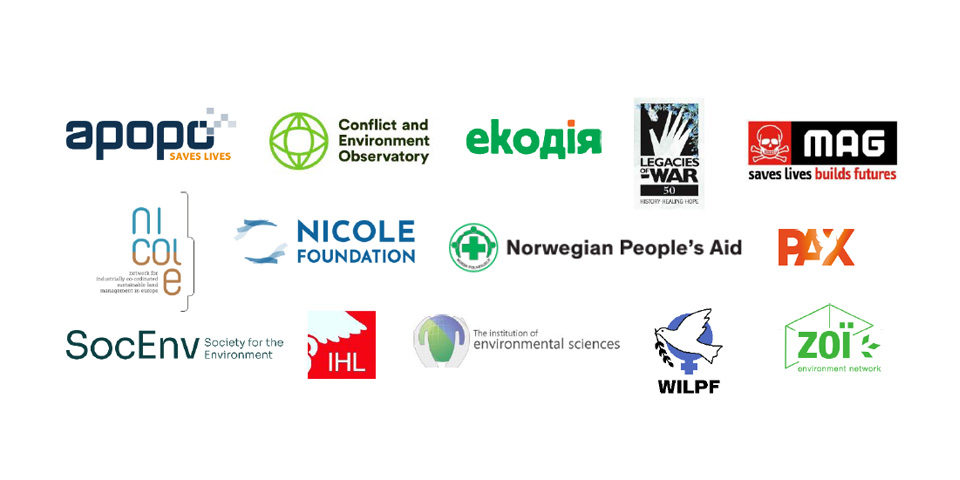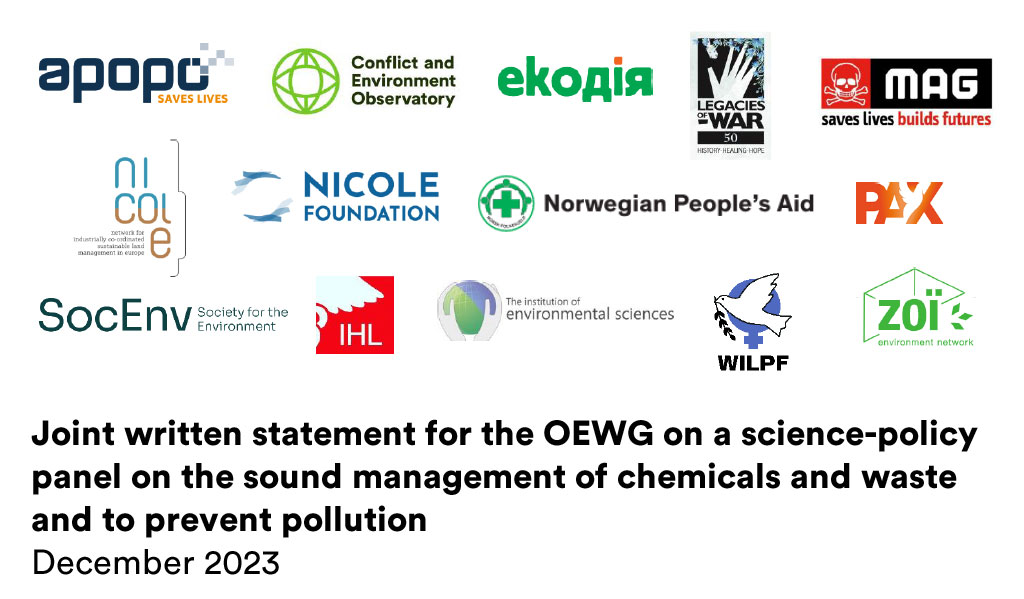The role of the Science-Policy Panel in addressing the health and ecological impact of conflict pollution and the toxic remnants of war
Our organisations welcomed UNEA-5’s adoption of resolution 5/8 in March 2022, and the decision to establish a Science-Policy Panel to contribute further to the sound management of chemicals and waste, and to prevent pollution. This statement supports earlier comments made for OWEG 1.1 and the need for the ‘health and ecological burden of conflict pollution’ to be addressed.
Armed conflict and pollution
Armed conflicts generate pollution, create and sustain the conditions where polluting practices can go unchecked, and intensify the population’s vulnerability to environmental pressures. Active armed conflict occurred in 56 states during 2022, yet the impact from both direct and indirect conflict pollution is under-addressed.
Russia’s war in Ukraine has increased attention on the environmental impacts of conflict, with Russia’s targeting of industrial complexes and fears that the war could cause a deadly chemical incident. The war in Gaza once again illustrates the health and environmental risks associated with the intensive use of explosive weapons in populated areas. While the circumstances vary, pollution risks occur wherever conflicts affect urban and industrial areas, or energy infrastructure. From acute chemical risks and environmental emergencies, to particulate matter and asbestos in destroyed cities, to the inability of conflict-affected states to meet their obligations under international agreements, armed conflicts and pollution are profoundly connected.
Alignment with international resolutions and declarations
In 2017, the United Nations Environment Assembly adopted resolution 3/1 on Pollution mitigation and control in areas affected by armed conflict or terrorism, the first ever UN resolution dedicated to conflict pollution. At UNEA-4, resolution 4/8 highlighted the challenge of solid waste management in conflict-affected states. The Science-Policy Panel can contribute to the implementation of these resolutions, and help build and sustain attention on the health and ecological risks of conflict pollution. The panel could also be of critical importance in encouraging research into the health and ecological burden of conflict pollution, in highlighting the need for environmental and epidemiological research in affected areas, and for victim assistance and environmental remediation.
In December 2022, the United Nations General Assembly adopted Resolution 77/104 on the Protection of the environment in relation to armed conflicts (PERAC). The PERAC legal framework contains principles on the toxic and hazardous remnants of war on land and at sea, and also addresses environmental assessments, remedial measures and compensation, relief and assistance and the need for access to information from military actors.1
UNEA resolution 3/1, and the PERAC principles, demonstrate the growing concern and acknowledgment of the risks that conflict pollution poses to people and ecosystems, and an appetite to address them. In this respect, we believe it vital that the proposed intergovernmental Science-Policy Panel on chemicals, waste and pollution include conflict pollution and the toxic remnants of war within the scope of its work. In so doing it would not only help ensure the implementation of UNEA 3/1 but also encourage and sustain ongoing attention on this currently under-addressed by globally relevant topic.
Our organisations stand ready to assist and support this process.
This is a joint statement on behalf of the following organisations:
- Apopo
- Conflict and Environment Observatory
- Centre for Environmental Initiatives “Ecoaction”
- Legacies of War
- Mines Advisory Group
- Network for Industrially Contaminated Land In Europe (NICOLE)
- NICOLE Foundation
- Norwegian People’s Aid
- PAX
- Society for the Environment
- The Institution of Environmental Sciences
- The International Humanitarian Law and Law Students Initiative
- Women’s International League for Peace and Freedom
- Zoï Environment Network
- This includes: Principle 23 on sharing and granting access to information, Principle 24 to cooperate with respect to post-armed conflict environmental assessments and remedial measures; Principle 25 for appropriate measures so that the damage does not remain unrepaired or uncompensated, and may consider establishing special compensation funds or providing other forms of relief or assistance; Principle 26 to remove or render harmless toxic or other hazardous remnants of war that are causing or risk causing damage to the environment; and Principle 27 to ensure that remnants of war at sea do not constitute a danger to the environment.






